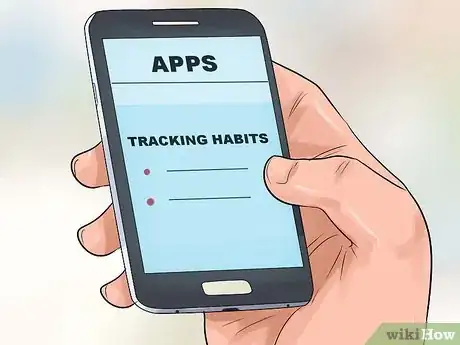This article was co-authored by Catherine Boswell, PhD. Dr. Catherine Boswell is a Licensed Psychologist and a Co-Founder of Psynergy Psychological Associates, a private therapy practice based in Houston, Texas. With over 15 years of experience, Dr. Boswell specializes in treating individuals, groups, couples, and families struggling with trauma, relationships, grief, and chronic pain. She holds a Ph.D. in Counseling Psychology from the University of Houston. Dr. Bowell has taught courses to Master’s level students at the University of Houston. She is also an author, speaker, and coach.
There are 16 references cited in this article, which can be found at the bottom of the page.
wikiHow marks an article as reader-approved once it receives enough positive feedback. In this case, 96% of readers who voted found the article helpful, earning it our reader-approved status.
This article has been viewed 451,635 times.
Temptation is about desiring something that's often not right or good for you. Often, temptation urges you to fulfill your desires in the short-term without giving thought to what may happen later. Unfortunately, temptations can also turn into obsessions. Giving in to temptation can leave you feeling dissatisfied, guilty, or upset. Fortunately, it's possible to learn how to resist temptations in your life and strengthen your self-control.
Steps
Responding to Temptations
-
1Try to understand why you're tempted. When you're thinking about what it is you want to avoid, it can help to try to identify the underlying thoughts or feelings that lead to that behavior. Those are different for everyone, but impulsive behaviors often happen when you're trying to cover up some uncomfortable thoughts or feelings.[1]
- For example, you may be more likely to drink after you have a conversation with a difficult family member.
- If you can figure out this pattern, it might help you be proactive in avoiding the self-destructive behavior.[2]
-
2Recognize potential temptation. Temptation is all about self-control, and tempting situations are often about the conflict between immediate gratification and long-term goals. For example, if you're on a diet, you may be tempted to eat a delicious piece of cheesecake that's beckoning you from the deli case. Immediate gratification would result from giving in to temptation and eating the cheesecake. However, giving in would also interfere with your long-term goal of becoming more healthy by avoiding high-sugar foods.
- As another example, if you're already in a relationship, become aware of people that might tempt you to cheat. These people may be old acquaintances that have come back into your life, your co-workers, or people that you interact with in private settings.
- However, temptation isn't always this obvious. For example, say you're a business professional and you're tempted to knock off early on a Friday afternoon a few days a month. A couple of early departures don't seem like a big deal, but this could represent to your employer that you can't be trusted with responsibility, which could jeopardize long-term goals such as promotion and advancement.
Advertisement -
3Remove yourself from temptation. Make it easier to deal with temptation by getting away from what tempts you. For instance, if you're trying to quit smoking, avoid places that you frequently smoked. You may even want to avoid people that you usually smoked with.
- If you're tempted to drink, the annual work party at the bar will probably challenge your determination. Stay alert for potential temptations and avoid them when possible. This way, you won't be caught off-guard and you'll always be prepared to deal with temptations.[3]
- If you can't completely remove yourself from a situation or person, try to manage the situation so that it's more difficult to act on your temptation. For example, if you're tempted to cheat with a friend, avoid one-on-one situations. Always meet in a group, if you have to see the person.[4]
-
4Be honest. If you're refusing something or someone that's tempting you, don't feel guilty or like you need to lie. Be honest about why you're refusing something. This can strengthen your resolve in the future and may even reduce the temptation.
- For example, if you're tempted to cheat and the person you're interested in asks you out, honestly refuse her by saying you're already in a relationship. Once she knows this, she may be less likely to flirt with you in the future.
-
5Visualize yourself resisting temptation. In this approach, picture yourself acknowledging or touching the temptation before putting it down and walking away from it. Imagine this experience in as much detail as you can. For example, if you're trying to avoid sweets, imagine holding a chocolate bar. Picture smelling it, touching it, and putting it down.[5]
- Once you've practiced enough, you may even purposely try to resist the temptation. Go to the store and confront your temptation. This technique is not appropriate for addictions, such as drug or alcohol addictions. Visualization of giving in or contact with paraphernalia can act as a trigger and make resistance to this temptation much harder.
-
6Think of the long-term consequences. It's easy to think of immediate gratification when you really want something. Take a minute to think of the longer term consequences before giving in to temptation. In some cases, such as cheating on a partner, the long-term consequences are extensive and often extreme. You will hurt your partner, you will damage that person's trust in you, and you may even lose the relationship. However, we're beset all the time with what researchers call "epsilon-cost temptations," or those little things that don't seem consequential on their own but add up to significant consequences. People often have a harder time refusing these temptations because they seem so minor.
- For example, trying a single cigarette or eating a single slice of cheesecake are not likely to have immediate, long-term, extensive negative consequences. However, smoking that cigarette makes you more likely to have another, and another, which increases your overall risk of highly negative consequences. And even a single cigarette can cause immediate damage to your body and raise your risk of diseases such as cancer.[6]
- Try to consider your actions in a broader context. A single slice of cheesecake won't kill you, but if you're trying to avoid sugar to become healthier, eating it will hold you back from that long-term goal. The extra calories will also add up over time if you keep giving in. Thinking about things this way, instead of as isolated incidents, can help improve self-control.
- You may even find that visualizing the long-term consequences can help you build your resistance. For example, if you're tempted to smoke, visualize yourself as a cancer patient hooked up to chemotherapy. Visualize how terrible you feel, how expensive your treatments have been, and how heartbroken your family is.[7]
-
7Distract yourself.[8] Sometimes, fixating on what's tempting you can make it harder to resist. Instead, research has shown that distracting yourself by doing something fun or that engages your mind can help fight temptation.[9] You might try meditating, yoga, going for a jog, or meeting up with friends. Whatever you choose to do to distract yourself, throw yourself into it completely.[10]
- You may want to do something that engages you with others who need help. Shift the focus of your attention away from yourself to people who'd appreciate you. It may take your mind off of the temptation.
- Having a specific "distraction plan" is a good idea. For example, tell yourself that if you notice the urge for a cigarette, you will get up and go for a short run. This will act as a distraction and improve your health, too.
-
8Do not give yourself a choice. If you're tempted by something, don't let yourself believe that you have the choice to give in or avoid it. If you remove choice from the situation, you'll have to refuse whatever's tempting you.
- For example, if you're feeling tempted to cheat on your partner, avoid flirting with a co-worker that you're interested in. Since you know you don't want to cheat, don't even act like you're interested.[11]
- As another example, if you're struggling to stay on your low-sugar eating plan given you by your doctor, you could refuse invitations to holiday parties that are likely to be full of sweets and rich foods. However, this option also limits your ability to socialize and interact with others, so consider whether this is the route you really want to take.
Improving Self-Control
-
1Make concrete plans.[12] Make an intentional plan for yourself, such as "I will not order cheesecake at lunch today so that I can stay on track with my healthy eating habits. I will have an apple instead" or "I will have only one beer at the party tonight and ask my partner to remind me if I go for another." Declaring these plans for yourself in concrete, specific terms can help you focus on your long-term goals, rather than immediate gratification.
- Framing your plans in terms of "if-then" may be helpful. For example, you might come up with this scenario: "If I am offered a piece of cake at the party, I will say 'No, thanks, I am watching my sugar,' and go start a conversation with someone close by."
-
2Get help from others. If you're finding it hard to say no to something, like another cigarette or piece of pie, ask your partner or a friend to help you change your mind. It's often helpful to simply tell someone that you're tempted.[13]
- For example, if you're at a party and trying to watch your drinking, tell your date to remind you of your plan after one drink.
- If you can find one where you feel comfortable, support groups can be a great way to get help when you're trying to overcome an addictive behavior.[14]
-
3Use technology. Hold yourself accountable by using apps or computer programs that allow you to track your habits. If you're trying to avoid spending money, use budgeting software to monitor your spending. Or, if you're watching your weight, use an application on your phone to keep tabs on what you're eating.[15]
- Using technology can also let you know when you're more likely to give in to temptation. For example, you might notice that you're more likely to overindulge on the weekends.
-
4Challenge someone else. If you find yourself tempted and know someone else trying to give up or avoid something, challenge her to a competition. For example, if you're wanting to exercise more, but having trouble, challenge your friend to see who can lose more weight or log more time at the gym. A friendly competition might be all you need to make you accountable to yourself (and each other).[16]
- Be sure to agree on terms of the challenge before you both begin.
-
5Practice gratitude. Gratitude enables you to remember what you have to be thankful for in your life. Focusing on these things can make you less likely to need other things.[17]
- Try writing down several things that you're thankful for every day.[18] Keep the list close and read through it whenever you feel tempted.
-
6Build up your skills through practice. Many research studies have shown that you can develop self-control even as an adult through practice. These exercises also increase efficiency and lower your impulsivity.[19] Just like your physical muscles, your self-control muscles will get stronger with routine exercise.[20]
- One way to practice is to try to change or break a habit, even a trivial one. So, if you notice that you always brush your teeth starting on the right side of your mouth, make a conscious effort to start on the left side instead.
- Setting a daily routine is another good way to practice. For example, you might make a plan to get up at 7:30 AM every day, including the weekends, and eat a cooked breakfast instead of grabbing a doughnut. As you practice this routine, you'll develop your self-control skills.
- You can also try to practice self-control in more meaningful ways, such as making the decision to bike to school twice a week instead of driving. Getting yourself in the habit of setting goals and following through will help you build up your self-control "muscles."
Avoiding Depletion
-
1Keep an eye on your self-control energy levels. Just like physical energy, self-control can be "used up."[21] When you exercise, you reach a point where your muscles are tired out and it becomes difficult for you to continue lifting those weights or running. When you exercise your decision-making skills, the same thing happens to your brain.
- One study found that students who had to exercise self-control in one task did poorer on a subsequent self-control task than students who hadn't had to flex those self-control "muscles" prior to the activity.[22] So, if you're going to a holiday party with a lot of sweets that you want to resist, make sure you don't also eat lunch in the breakroom near that open box of doughnuts. This constant pressure to resist temptation could wear you down.
- The same study also found that decision-making can impact your self-control ability. If you know you're going to be in a situation that requires you to make decisions, such as a high-pressure meeting at work, try to avoid other situations that day that will require you to resist temptation. For example, perhaps say no to a big party in the evening if you know you will have to make some decisions earlier in the day.
-
2Eat well. Eating habits can be a big source of temptation, but healthy eating habits can also help you avoid depleting your self-control resources. One study found that students who had not eaten recently did worse on a self-control task than students who had had a recent meal and had stable blood sugar levels.[23]
- Even a quick refreshment, such as a glass of lemonade or a piece of fruit, can help bring your glucose levels up and improve your self-control.
- Eating foods high in fiber, such as beans, oats, potatoes, and vegetables, will help your glucose levels stay steady rather than dipping or spiking. They also take longer to digest, which will help you feel fuller longer and can help fight food-related temptation.[24]
-
3Avoid stress. Stress can use up your self-control resources really quickly.[25] There are several ways you can deal with stress:[26]
- Try daily techniques such as yoga or tai chi.
- Meditation helps many people relax.
- Deep breathing exercises can be helpful, and you can do them anywhere, anytime.
- Get enough rest. Sleep at least 7-9 hours a night, and keep a sleep routine, even on weekends.[27]
Expert Q&A
Did you know you can get expert answers for this article?
Unlock expert answers by supporting wikiHow
-
QuestionHow do you get rid of temptations?
 Catherine Boswell, PhDDr. Catherine Boswell is a Licensed Psychologist and a Co-Founder of Psynergy Psychological Associates, a private therapy practice based in Houston, Texas. With over 15 years of experience, Dr. Boswell specializes in treating individuals, groups, couples, and families struggling with trauma, relationships, grief, and chronic pain. She holds a Ph.D. in Counseling Psychology from the University of Houston. Dr. Bowell has taught courses to Master’s level students at the University of Houston. She is also an author, speaker, and coach.
Catherine Boswell, PhDDr. Catherine Boswell is a Licensed Psychologist and a Co-Founder of Psynergy Psychological Associates, a private therapy practice based in Houston, Texas. With over 15 years of experience, Dr. Boswell specializes in treating individuals, groups, couples, and families struggling with trauma, relationships, grief, and chronic pain. She holds a Ph.D. in Counseling Psychology from the University of Houston. Dr. Bowell has taught courses to Master’s level students at the University of Houston. She is also an author, speaker, and coach.
Licensed Psychologist
-
QuestionDo support groups really help?
 Catherine Boswell, PhDDr. Catherine Boswell is a Licensed Psychologist and a Co-Founder of Psynergy Psychological Associates, a private therapy practice based in Houston, Texas. With over 15 years of experience, Dr. Boswell specializes in treating individuals, groups, couples, and families struggling with trauma, relationships, grief, and chronic pain. She holds a Ph.D. in Counseling Psychology from the University of Houston. Dr. Bowell has taught courses to Master’s level students at the University of Houston. She is also an author, speaker, and coach.
Catherine Boswell, PhDDr. Catherine Boswell is a Licensed Psychologist and a Co-Founder of Psynergy Psychological Associates, a private therapy practice based in Houston, Texas. With over 15 years of experience, Dr. Boswell specializes in treating individuals, groups, couples, and families struggling with trauma, relationships, grief, and chronic pain. She holds a Ph.D. in Counseling Psychology from the University of Houston. Dr. Bowell has taught courses to Master’s level students at the University of Houston. She is also an author, speaker, and coach.
Licensed Psychologist Because addictive behavior is often a way to avoid the intense pain of isolation and loneliness, support groups are a great way to find help. It is important, however, that you find one that suits you and that involves people who share some of your core beliefs. It's also a good idea to commit to calling, texting, or meeting a trusted friend or sponsor when you feel tempted.
Because addictive behavior is often a way to avoid the intense pain of isolation and loneliness, support groups are a great way to find help. It is important, however, that you find one that suits you and that involves people who share some of your core beliefs. It's also a good idea to commit to calling, texting, or meeting a trusted friend or sponsor when you feel tempted.
References
- ↑ Catherine Boswell, PhD. Licensed Psychologist. Expert Interview. 18 December 2020.
- ↑ Catherine Boswell, PhD. Licensed Psychologist. Expert Interview. 18 December 2020.
- ↑ Sheldon, O. J., & Fishbach, A. (2015). Anticipating and resisting the temptation to behave unethically. Personality And Social Psychology Bulletin, 41(7), 962-975. doi:10.1177/0146167215586196
- ↑ https://www.psychologytoday.com/blog/resolution-not-conflict/201109/why-affairs-tempt-us-and-how-prevent-them
- ↑ https://www.psychologytoday.com/us/blog/cravings/201911/4-ways-avoid-temptation-and-reach-your-goals
- ↑ http://healthland.time.com/2010/12/09/a-single-cigarette-can-raise-the-risk-of-cancer-and-heart-disease/
- ↑ https://www.sciencenews.org/article/mastering-art-self-control
- ↑ Mischel, W., Shoda, Y., & Rodriguez, M. I. (1989). Delay of gratification in children. Science, 244, 933–938. http://dx.doi.org/10.1126/science.2658056
- ↑ https://www.sciencenews.org/article/mastering-art-self-control
- ↑ http://rethinkingdrinking.niaaa.nih.gov/tools/Interactive-worksheets-and-more/Stay-in-control/Coping-With-Urges-To-drink.aspx
- ↑ https://www.psychologytoday.com/blog/resolution-not-conflict/201109/why-affairs-tempt-us-and-how-prevent-them
- ↑ https://www.sciencenews.org/article/mastering-art-self-control
- ↑ http://www.csmonitor.com/Commentary/Opinion/2011/0325/You-vs.-temptation-Why-self-control-has-gotten-so-hard
- ↑ Catherine Boswell, PhD. Licensed Psychologist. Expert Interview. 18 December 2020.
- ↑ https://www.uopeople.edu/blog/self-discipline-for-students/
- ↑ https://www.uopeople.edu/blog/self-discipline-for-students/
- ↑ https://www.health.harvard.edu/healthbeat/giving-thanks-can-make-you-happier
- ↑ Richard Wiseman, 59 Seconds: Think a Little, Change a Lot, Chapter 1, (2010), ISBN 978-0-330-51160-5
- ↑ Mischel, W., Shoda, Y., & Rodriguez, M. I. (1989). Delay of gratification in children. Science, 244, 933–938. http://dx.doi.org/10.1126/science.2658056
- ↑ http://www.apa.org/monitor/2012/01/self-control.aspx
- ↑ http://www.apa.org/monitor/2012/01/self-control.aspx
- ↑ http://www.apa.org/monitor/2012/01/self-control.aspx
- ↑ http://www.apa.org/monitor/2012/01/self-control.aspx
- ↑ https://health.clevelandclinic.org/11-best-high-fiber-foods/
- ↑ https://www.sciencenews.org/article/mastering-art-self-control
- ↑ https://www.cdc.gov/violenceprevention/about/copingwith-stresstips.html
- ↑ https://www.cdc.gov/sleep/features/getting-enough-sleep.html
About This Article
Giving in to temptation can leave you feeling dissatisfied, guilty, or upset, but you can learn how to respond to temptations in more positive ways. One way to deal with temptation is to get away from whatever it is that tempts you. For example, if you’re trying to quit smoking, avoid places that you frequently smoked. You can also try to visualize yourself resisting temptation. For example, if you’re avoiding sweets, imagine holding a chocolate bar, smelling it, touching it, then putting it down. While it’s easy to think about the instant gratification of giving in to temptation, try to take a minute to think about the long-term consequences too before giving in. Visualizing the long-term impacts can also help build your resistance. For example, if you’re tempted to smoke, imagine yourself as a cancer patient and think about how terrible you feel. To learn how to use technology to improve your self-control, keep reading!














































































